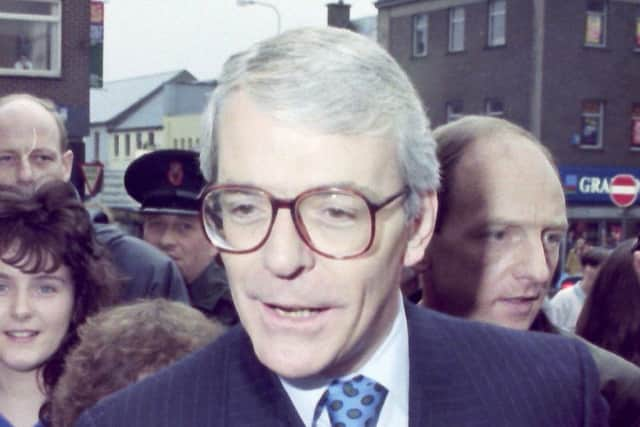Declassified files: Major backed ban on blasphemous crucifixion sex fanstasy film
and live on Freeview channel 276
The then prime minister felt “sufficiently strongly” about the case of Visions of Ecstasy, an erotic art-house movie about Christ, he inquired about the possibility of Britain being exempted under the European Convention on Human Rights if that proved necessary.
The controversial 18-minute video depicted Carmelite nun St Teresa’s sexual fantasies about Jesus on the cross.
Advertisement
Hide AdAdvertisement
Hide AdIt was judged unfit for distribution by the British Board of Film Classification (BBFC) because of its treatment of a “sacred” subject.


When director Nigel Wingrove applied to take the case before the European Court of Human Rights, arguing it breached his freedom of expression, Mr Major described the state of affairs as “wholly unacceptable”.
In a document dated August 1994 sent to senior government figures including the Foreign Secretary and Lord Chancellor, Mr Major writes: “I must make it clear that I would not tolerate a position which required the Government or the BBFC to grant a certificate to this film or to others of a similar type.
“This is a matter on which I feel sufficiently strongly to be prepared to consider a derogation from the European Convention on Human Rights if that were to be necessary in the final analysis.
Advertisement
Hide AdAdvertisement
Hide Ad“I must say I find the position in which we find ourselves wholly unacceptable.”
In a reply, then Foreign Secretary Douglas Hurd warned about doing anything “likely to weaken the fabric of the convention”, adding that “we cannot, in practice, derogate from it except in cases of war or threats to the life of the nation”.
It states: “We certainly do not want to find ourselves in a situation in which Government intervention on moral issues in Britain is dictated by international organisations.
“At the same time, the European Convention on Human Rights is one of the core agreements enshrining western standards of behaviour.
Advertisement
Hide AdAdvertisement
Hide Ad“It is particularly important as the countries of eastern Europe and the former Soviet Union undertake the task of adapting to our standards.”
However, in a surprise ruling, Britain’s blasphemy laws were backed by the European Court of Human Rights when it threw out the claim two years later.
The 1989 film, the only video ever be banned on grounds of blasphemy in the UK, was finally given an 18-rated certificate in 2012 after the common law offence of blasphemous libel was abolished in England and Wales in 2008.
The documents are part of the annual release of Cabinet Office files at the National Archives in Kew, west London.
Advertisement
Hide AdAdvertisement
Hide AdAlso in the bundle was an admiring letter from Mr Major to the moralist and clean-up campaigner Mary Whitehouse as she retired as president of the National Viewers’ and Listeners’ Association.
It read: “Your campaign has played a crucial part in highlighting the widespread concern that we should not lower our standards of what is acceptable viewing on film, television and video; and you have been instrumental in warning of the perils if these standards fall.
“You yourself are one of the best examples of how it is possible in a free country like Britain for a private citizen with energy, initiative and commitment to carve out a distinctive and valued niche in our national life.”